1918

THE END

1918

THE END
Irish troops of the 8th. Liverpool Irish Regiment, 57th. Division, liberating the Northern French town of Lille, 18 October 1918 (IWM)
THE IRISH IN UNIFORM
1918
THE END |
|
1918
THE END |
Irish troops of the 8th. Liverpool Irish Regiment, 57th. Division, liberating the Northern French town of Lille, 18 October 1918 (IWM) |
||
| DATE | MAJOR EVENTS | NOTES ON EVENTS & BATTLE ACTIONS |
| 16 November 1918 | Allies advance into Germany | Allied troops begin their advance into Germany behind the retreating Germany Army |
| 16 November 1918 | New state | Poland is declared a seperate and sovereign state |
| 18 November 1918 | New state | A National Council proclaims Latvia's independence from Russia |
| 21 November 1918 | Naval surrender | The German Battle Fleet surrenders to the British Navy off the Forth of Forth to the East of Scotland in The North Sea. |
| 23 November 1918 | New state | In the Balkans, a new state is proclaimed as the Kingdom of Serbs, Croats and Slovenes is created under the regency of Alexander I (son of King Peter of Serbia). This country was renamed Yugo-Slavia in 1929. |
 |
AFTERMATH |
 |
"They shall not grow old, as we who are left grow old, Age shall not weary them, nor the years condemn, At the going down of the sun, and in the morning, We will remember them" These words are spoken before the sounding of the poignant trumpet call "The Last Post" at Remembrance Services every year throughout the countries of then former Allies of 1914-1918, which are held on the anniversary of the signing of The General Armistice on 11 November 1918. The war dead are remembered and honoured "at the eleventh hour of the eleventh day of the eleventh month" each year, and Remembrance Day has been extended to cover the dead of World War II (1939-1945) also. In 1919, following the occupation of Germany by Allied troops, and the collapse of the empires of Russia, Austria-Hungary and Turkey (The Ottoman Empire); the Allies met at Versailles in France. Here was drawn up and signed by The Allies and The Central Powers (on 28 July 1919) The Treaty of Versailles, which formalised new country boundaries throughout Europe and elsewhere. Germany lost all her colonies in Africa and condsiderable territories in Europe. France regained the province of Alsace-Lorraine, over which it had fought several times with Germany during the Nineteenth and previous centuries. Belgium gained the territories of Malmedy and Eupen, Poland gained most of Posen and West Prussia. The Polish port of Danzig became a Free State. Plebicites were to decide the fate of the territories of Shleswig, Upper Silesia and the Saar. The German region of The Saar was put under international administration for 15 years. The French were allowed control of the coal mines along the Saar valley as compensation for the fact that during the 1914-1918 war German military action had ruined the French mines on the coalfields of North-Eastern France. Germany had to pay for the occupation of its homeland, and was also charged by The Reparations Committee to pay £6,600 million pounds sterling in compensation for war damage. The French Marshal Foch, Supreme Commander of the Allied Forces in 1918 boycotted the Treaty of Versailles by refusing to sign it, believing that Germany would not long bear the yoke of defeat, but would arise again to war. He said, " This is not peace. It is an armistice for 20 years". Sadly, his words turned out to be prophetically accurate, as by1938 Germany was again about to go to war in Europe and invade France once more. |
||
| Use this small arrow button to go back to the World War 1 Index | ||